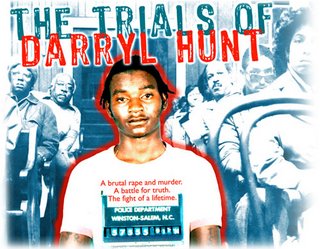Sunday, February 16, 2014
Thursday, August 09, 2012
Tuesday, January 15, 2008
Monday, December 17, 2007
Look at Sister Helen Prejean in the lower right hand corner. Way to go Abe Bonowitz and New Jerseyans for Alternatives to the Death Penalty! What a huge victory in moving our country forward!
Saturday, April 14, 2007
On my most recent trip back to the land of my birth, I was reminded yet again of how California will never compare to the unassuming, good country people I've left behind. Oh Georgia-line, even in my moments frustration with some of your more dated ways, I am still proud to count myself amongst your native sons!
So, in the name of all that is good, I will now make the most feeble attempt to share these simple pleasures of civil fraternity with a wider audience. We must patronize and cherish them with all our might! These festivals are our last hope of warding off the inevitable cultural homogenization wrought by great weather and cheap housing prices.
The Okra Strut

The SC Poultry Festival (My sister was runner-up this past year in the Miss Poultry Pageant!)
Allendale's Spring Cooter Fest (My new favorite, although shamefully I've never been)
Friday, February 09, 2007
"Silence reigned over the before tumultuous but now deserted deck. An intense copper calm, like a universal yellow lotus , was more and more unfolding its noiseless measureless leaves upon the sea."
I've never read a more beautifully described sunset, and I dare you to find one either! If you can bear the useless compendium of whale and whaling know-how, I highly recommend Moby Dick. I read it a while ago, and every tenth chapter or so more than made up for the nine preceding. Oh the beautiful humanity.
Wednesday, October 25, 2006

Did you know that South Carolina, in addition to having the most beautiful state flag in the union, is also one of the only other states besides New York that allows for fusion voting? What is "fusion voting" you ask??? It is the ability of a candidate to run for office under the banner of more than one party. For example, imagine 2004 if Al Gore had been able to get the endorsement of the Green Party. It's a way for candidates to buff up their ideological bona fides while not jumping ship for a third party or letting a third party candidate draw votes away from them.
The most famous of the fusionist parties is the Working Families Party, for whose candidate I voted by absentee ballot recently. Good luck Lee Ballenger of District 3! Even if you lose, you'll know that not only the Democrats but also the Working Families Party gave you their support.
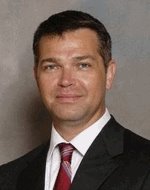
Thursday, July 06, 2006
Have you ever been held in rapt discussion that was both entertaining, intellectually challenging, and where you felt like both you and the person you were debating actually came away having learned something? Sadly, most conversations must remain inanely superficial or risk a flaring of tempers and resentment, so I love it when I can find someone with whom I can verbally spar while maintaining humorous sensibilities and a spirit of shared inquiry.
My friend Skye and I enjoy discussing metaphysics. We like to collectively ponder conceptions of God, notions of morality, Truth, and Existence, among other things. One thing is for certain; there are no easy answers.
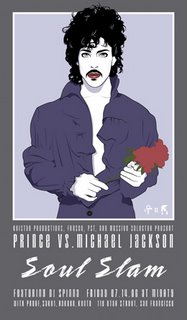
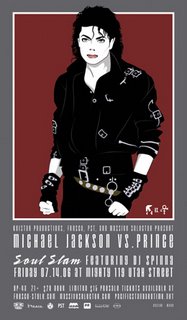
Skye: The "mattering" that matters is that you matter *to other people*. That other people love you, and that your love for them matters. ("Love" in a broad sense.) And to extend it past human-centric language: that you are in a web of mattering (love/compassion) with other humans, other animals, all the beings on the earth, and the earth itself. Do I matter to the earth? Of course!! (An existentialist/nihilist/pessimist would say "no, the earth doesn't give a damn if you live or die", but that's not the whole story, as Gary Snyder & Native wisdom has taught me... as I am part of the earth ("earth" in a broad sense), of course the earth cares about me, just like the Spotted Owls, Cougars, and Frogs!) Now, when I "matter" to the earth, it means among other things that my nutrients matter, so if wolves killed me, the bacteria would re-use my nitrogen for the wild blueberries growing on the spot. If I'm stuck in my "small self" (the ego), that really scares & bothers me. But if I can identify with the blueberries as well as my ego, then it's not bad at all! Really it's liberating and joyful to think that one day I will be blueberries.
Martin: Interesting. I'm not really sure if the vocabulary of "mattering" really captures the how we matter to the Earth. The existentialist in me would tell you that even if we become blueberries in a a couple hundred years, the whole galaxy is on a crash course with another galaxy in 3 billion years, and if we survive our sun will explode 2 billion years later, becoming a red giant. Poof! Annihilation. Every living thing on Earth is transitory and ephemeral in the since of "forever." The stuff of the cosmos is really just this unfeeling un-biological force. Acknowledging this tragedy, the pathos of what is never being the same as what was or what will be, makes us human. so if this "Earth-as-one-big-organism" mattering world-view is so important, I'd rethink it, because while we and all the creatures on Earth might "matter" to the Earth can that be extrapolated to the entire universe?
Skye: I think its about feeling, and letting go. I AM fine now with being blueberries one day, or stardust to extend to the case when the earth blows up. And perhaps the whole universe will vanish one day, and then my remants will be nothing, not even dust in the wind. Well the zen buddhist wouldn't mind that extenstion at all.
me --> bear's food --> blueberries --> kid's food --> eventually stardust --> eventually nothing.
Well, if what we are comes out of the Nothing (the Nihil, according to the recent death of god theologians), then why mind that we go back?
I think the point isnt about theories & such, its about accepting death & limits. the more i enter "community" (which in public-transit-less houston i was at the extreme other end of), the less i mind myself dying.
Martin: YES! You are right, but I can't let go of my human-ness either. I'm not a Neitzchean. I think that you can have your morals and your politics and your societal culture and give and receive meaning to and from them, all without this higher order power/universal organism/letting go (in which, by the way, I still choose to place my Faith). But it is still tragic that we know we will never recapture certain moments ever again. Even if we tried to re-enact them, it would be only a façade of what once was - and THAT in and of itself would still be beautiful but again comletely ephemeral. And yes, this continued attempt to live life over and over and new things and old things is beautiful, but also tragic because it will cease. It will be replaced by blueberries or stardust or an unimaginable state but it will still cease nonetheless. And that makes me cry sometimes.
Skye: Hm, right now it doesnt seem tragic that we won't have certain moments again... I think I've moved from clutching too tightly to "the particular" and instead letting go and seeing all particulars as "transparent to transcendence" (love). That's Joseph Campbells phrase, and I like it a lot. I've thought about it a ton this year too... because for a long time I was super sad that I couldn't go back to Philmont (where i used to work 3 summers, 135000 acres in NM, boy scout backpacking base, gorgeous mountains...). especially in May when all my friends were going back, and i was still here... but im now ok with it. Knowing that philmont is still there, even without me there... finding that i care more about philmont to be there than for me to be at it... like a discovery of "selfless love" for the first time. Crazy.
Martin: Selfless love? Not so sure about it. I've always felt like I benefitted whenever I've done something requiring "selfless love."
Skye: "Selfless love" as I see it is discovering that there are things you care about so much that they matter more "in themself" than they matter to have you enjoying it. And as the Hindus say, all is Self really, so the point is just to move from little self to big Self...
Martin: Okay, yes again, but the "in themselves" is transitory as well. So are you just getting at the idea of the whatever "in themselves" is enough for you to go on? Because I mean I love the beach, but it's eroding, the mountains are changing, Senegal is desertifying, the Milky Way is headed for Andromeda. What I'm saying is that basically it's all constantly changing, growing, decomposing, swirling in the cosmic soup.
Skye: I dont mind that all things must pass... I dont have any "reason" per se. Well, I just read "A Wizard of Earthsea" by Le Guin, and it helped me be ok with transitoriness. The guy goes: "In order for a word to be spoken, there must be silence -- before and after." I never quite thought about it that way before.
*****
Nor had I, Skye, nor had I... In other news, numbers don't need humans to exist. Why you might ask? Because ants can count.
(Note: The above conversation was edited for brevity (no lie) and clarity. It was the result of a very long gmail conversation over the course of a morning avoiding data-entry work like the plague)
Friday, May 19, 2006
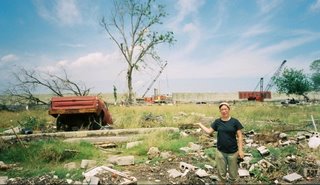
I believe my memories will seem more appropriate as they accumulate the dreamy gauze of passing time. Maybe they will become as my first memories of New Orleans, when I was seven years old: vague images of walking around in trashbag ponchos, making sure Mema Caver was satisfied by stopping for beignet. This trip by contrast, seems too crisp, too real; yet the images I retain seem equally incredible. Here are a few of those.
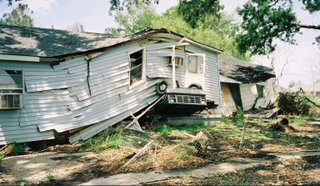
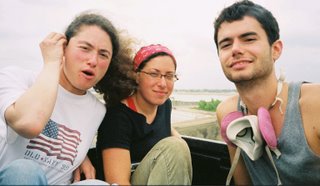
Taking a break in the Lower 9th Ward, I decide to go for a walk with Kavanah to survey some of the streets and eat one of the ubiquitous Detour® protein bars that seemed to keep coming in to Common Ground on a daily basis. The remnants of the destruction was brutal and grotesque, as if gravity had forgotten to function for a time and suddenly remembered its duties in one devastating coup. In the distance we could see the broken levee, still being repaired. A few people were driving around, most not even getting out of their cars, snapping photos from the window. At Blue House, one woman mouthed “Thank you” to me as I carried out a wheelbarrow of cardboard. She and I both were participating in our own versions of disaster tourism...
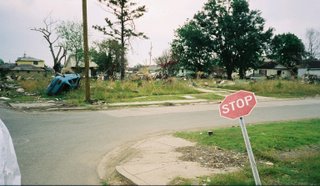
Six, seven, now eight of us hard at work stripping down a house, attacking it like some massive carcass – this is why they call it “gutting.” In our arsenal are sledgehammers, crowbars, prybars, and steel toed boots. Suddenly over the din of the splintering of boards and pounding of drywall we hear a repetitive melody growing in the distance. We stop work and go outside where an unflappable ice cream truck is plodding down the street. But ice cream man, there aren’t any children at this home or the next one, or the next one. They left their books and toys on the porch and now we are tearing there houses apart, leaving only a skeleton of wooden beams. Judging by the foundation on this one, the whole thing may have to go...

I’m doing yoga at sunset on the third floor of a Catholic school that now houses volunteers. The group is asked to focus on our third eye as we sit in pose and envision ourselves floating up above New Orleans, then higher until we are looking down on planet Earth, then even further out to the ethers of the universe. These classrooms were where many surviving residents clung to for life when the flood waters rushed higher. At night gunfire can be heard in the distance...
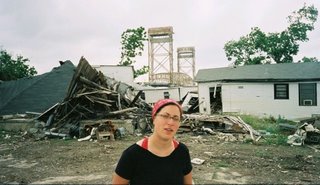
After tearing a part of roofing down off the deck of his house and helping him paint inside, an extremely hospitable resident takes us around the corner for Chinese food and beer. We eat it back at his place and listen to stories of how he used to deal drugs and went to jail for 8 years. How he came to New Orleans to get a fresh start and after volunteering for a while, found a job cooking and catering. He’s optimistic to see his children in the coming months for the first time in years...
We’re moving soggy boxes of rations off a U-Haul truck on to pallets which we will then tarp. We’re moving other food boxes, speckled with black mold, out of the kitchen area and then tarping them, too. All of a sudden two low-flying army helicopters swoop down, arching over the city. Somebody says it’s forward security for President Bush. As we are finishing tarping one of the residents stops by and says that Bush was there, two blocks away. “The Secret Service stopped me and told me to turn around or they would escort me away,” he said. In the paper the next day there was Bush, holding hands with a 9th Ward resident and frowning. Bruce Springstein also paid a visit while he was in town for Jazzfest, stopping by the Blue House and signing autographs. I was at another site, but apparently he was very personable...
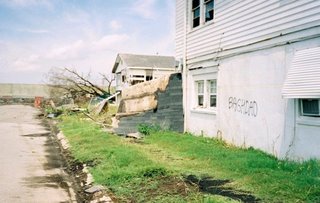
I’m shooting basketball with a survivor and another volunteer in the school gym. The hardwood court is long gone, instead there is a plastic tarp covering concrete. The goal is right in front of a stage that has a huge plastic tarp covering the entire opening. There is a sign that reads something like – “There is asbestos on this stage, do not play basketball.” We pretend not to notice it. Instead we listen to the middle-aged man tell stories of how 20 years ago young men from all around the neighborhood would come and play pick-up games in this gym. As he relished those memories of neighborhood glory, I wondered just how much I would savor my own memories sharing the court...
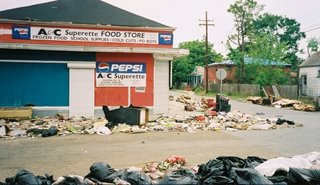
Common Ground’s motto is “solidarity not charity.” Survivor’s volunteer a portion of their time to rebuilding and are provided room and board and time to look for work and reassemble their lives. Volunteers coming in from outside New Orleans are expected to rise at 6:30 am daily and put in at least 6-8 hours of work based on their capabilities in exchange for three home-cooked meals, somewhat reliable running water, and a place to lie down at the end of the day. They also receive orientation and reading materials on racism and the history of the 9th ward. Common Ground is thus a kind of laboratory for rebuilding community whereby everyone is learning experientially what social justice means.
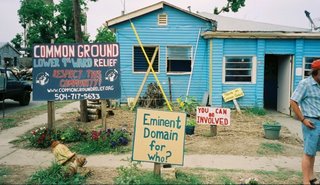
As in all laboratories, experiments are done through trial and error. As we left Common Ground, there was a transition underway. Tent city was coming down. New security measures were being instituted – including a meeting with a leader of a local gang to secure Common Ground as “neutral ground” as members moved back into the area. A new summer schedule was being phased in. Preparations were being made for a large influx of summer volunteers. People who thought of Common Ground as an “activist’s resort” were going to be asked to leave.

I wish I could have stayed longer in New Orleans. I felt like the city held a certain redemptive power over me. In all of the stifling wreckage, I felt really free, and I felt like I was doing something real. We knew that by coming down for a week, we weren’t contributing nearly as much as we received. I went anyway though, and the privilege was all mine.
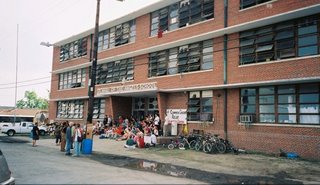
As we left New Orleans the most amazing song came on the stereo. It was on a jazz cd made special by Kavannah for the trip. Kermit Ruffins doing a remake of an old Louis Armstrong standard…

By and by, when the morning comes,
All the saints of God are gathering home.
We will tell the story how we've overcome
We will understand it better by and by.
We are often destitute of the things that life demands,
Want of shelter and of food, thirsty hill and barren land;
But we're trusting in the Lord, and according to His word,
We will understand it better by and by.
By and by, when the morning comes,
All the saints of God are gathering home.
We will tell the story how we’ve overcome
We will understand it better by and by.
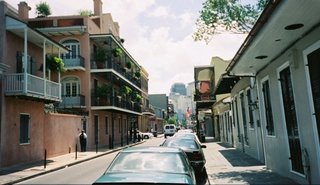
Monday, April 24, 2006
Wednesday, April 19, 2006
Wednesday, April 12, 2006
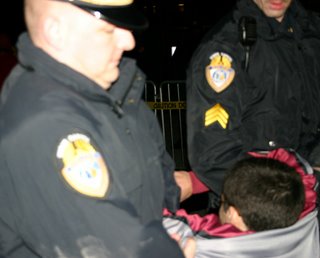
A Note on Peaceful Rebellion
The question of why to engage in civil disobedience has been answered by thinkers from Socrates to St. Augustine to Martin Luther King. I will not attempt to rehash their logic nor the circumstances of their conclusions except to say that the common strand in their arguments – indeed in most arguments for civil disobedience – is the idea that “an unjust law is not a law.” [1] Now many people might take issue with this idea and rightfully so. In a stroke the argument drives a stake through one of the most basic assumptions of Western society, a government by the rule of law. In so doing it subjects our notion of justice to scrutiny. Instead of framing justice as an allegiance to the letter of the law, it sees justice as embodied by living virtuously. If this goes against the law, then the law should be disregarded, broken, a virtuous alternative acted out. In this sense it can accurately be described as a form of nonviolent vigilantism.
Accordingly, the claims of injustice leading to acts of civil disobedience cannot be argued against in any effective manner. While this may not seem too problematic when we think of visionaries like Martin Luther King and others, imagine instead of Rev. King a man named Rev. Billy, who protests consumerism by holding church in Wal-Mart parking lots and “exorcizing” Starbucks cash registers.[2] If that seems too farcical, then imagine instead a Muslim girl or a Sikh boy refusing to take off their head coverings in violation of French laws of laïcité.[3] In either case the claim of injustice, and of subsequent willful disregard for the law, lies outside the traditional norms of public discourse and democratic rule. Vigilantes are always righteous in their minds; history decides which are prophets and which are fools.
Marx once said of the death penalty, “How miserable is a society that knows no better means of defense than the hangman.”[4] Those words resonate loudly when you learn of Perrie Simpson’s life. While Perrie was born with brain damage from a beating suffered by his mother, his brother was left blind and permanently incapacitated from similar abuse. He was transferred to 22 different foster homes before the age of 18, and found himself at 21, homeless with no skills and nowhere to go. This does not excuse his murder of Jean Darter, to which he admitted and expressed much remorse. It does speak to the impotency of a system which seeks to prevent murder through murder.
I am no prophet. Most would deem the actions I took along with 14 others the night of Perrie Simpson’s execution to be quite foolish. When I think back now on it – a rag tag group of divinity school students, Catholic Workers, professors, a pastor, and other activists, some donning sack cloth and ash as a sign of atonement as we approached a line of armed police officers in an attempt to block the prison’s main entrance – it all seems pretty absurd. What did we think we were going to accomplish? Did we simply want to get arrested?
It has been said that segregation did not end the day Rosa Parks refused to give up her seat, but it ended for her that day. Of course she did not wish for arrest any more than we did, but faced with an intolerable burden, she preferred the implications of arrest rather than be an idle bystander to injustice.
When we were pushed back by the police we knelt down and quoted scripture, reading from the book of Lamentations:[5]
When all the prisoners of the land
Are crushed under foot,
When human rights are perverted
In the presence of the Most High,
When one's case is subverted,
--Does the Lord not see it?
Let us test and examine our ways,
And return to the Lord.
Let us lift up our hearts as well as our hands,
To God in Heaven.
We have transgressed and rebelled,
And you have not forgiven.
My eyes flow with rivers of tears
Because of the destruction of my people.
My eyes will flow without ceasing,
Without respite,
Until the Lord from heaven looks down,
And sees.
We, of course, did not end the death penalty by our civil disobedience. We did not even stop the execution of Perrie Simpson, but our participation in the idolatry of security and its diffuse culpability ended that night. Prophets? Fools? Vigilantes? I love what Camus has to say about André Breton, an artist of rebellion who was one of the fathers of surrealism. Camus writes “…Breton chose love. In the general meanness of his times – and this cannot be forgotten – he is the only person who wrote profoundly on love. Love is the entranced morality that served this exile as a native land.” (my emphasis).[6] Call me and the others arrested that night what you must, but do not say we were paralyzed by despair. No, we joined one another, and we took action.
[1] See for example Plato’s Apology, Augustine’s On Free Will, and King’s “Letter from Birmingham Jail”
[2] Visit http://www.revbilly.com/; http://en.wikipedia.org/wiki/Church_of_Stop_Shopping; see also What Should I Do If Reverend Billy Is in My Store? by Bill Talen
[3] A great background article can be found at http://www.bbc.co.uk/religion/news/indepth/france/
[4] Marx, “Capital Punishment,” New-York Daily Tribune, February 17-18 1853
[5] Lamentations (3:34-36, 40-42, 48-50)
[6] Albert Camus, The Rebel (New York: Knopf, 1956) p. 99


